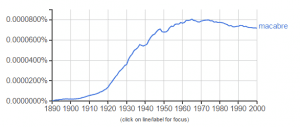Macabre is an adjective describing something or someone as having to do with or representing death in a dark or twisted way. Things that are macabre elicit fear or shock from those who view them. It can also be used to talk about things that have to do with violence or harm to others, even if it does not result in actual death.
The word comes from the phrase danse macabre, or dance of death, a form of art in the fifteenth century to remind people that everyone dies and they must be more concerned about their spiritual welfare than their temporal welfare.
Interestingly, the word has grown in popularity since 1900 and peaked around 1970, as shown in the Ngram pictured below.

Examples
So what is it about the macabre ritual that is the death row last meal that we all seem to find so fascinating? [New Statesman]
Visually its a glorious and macabre fantasy, but Miyazaki’s games deal just as much in practicality. [The Telegraph]
An Amnesty International official noted, “The notion that Raif Badawi must be allowed to heal so that he can suffer this cruel punishment again and again is macabre and outrageous.” [The Washington Post]
“It is not macabre, it is not horror, it is not Friday the 13th or anything like that,” he said. “This is a very family-oriented tradition. It is a way for families to connect with each other as well as the dead.” [Texas Public Radio]